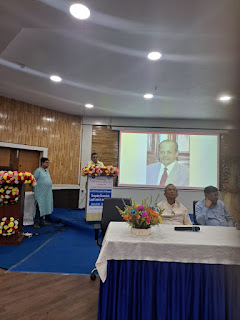Tribute to
Prof. (Dr.) N. R. Madhava Menon on His Birth Anniversary
BY
Prof. (Dr.) Sarfaraz Ahmed Khan
(Speech delivered on 4th May, 2025
at Room 301, WBNUJS)
Respected Prof. (Dr.)
N. L. Mitra, Prof. (Dr.) N. K. Chakrabarti — our esteemed Vice-Chancellor,
under whose initiative this memorial event was first conceived — Prof. (Dr.)
Shashikala Gurpur, Prof. (Dr.) Anirban Mazumdar, founding faculty member of
WBNUJS, my distinguished colleagues, dear research scholars, students, and all
present here — a very good morning to you all.
It is an honour and an emotional moment for me to speak on the birth
anniversary of Prof. (Dr.) N. R. Madhava Menon — a legal luminary, an
institution-builder, and above all, a teacher in the truest sense of the word.
Widely regarded as the father of modern legal education in India,
Prof. Menon revolutionized the way we think about law and its teaching. He
envisioned a system where law wasn’t just studied, but lived — where students
were trained not only to understand legal principles, but also to use them to
serve society.
This vision took shape in 1987, when he founded the National Law School
of India University (NLSIU) in Bangalore — the country’s first national law
university. Later, he went on to become the founding Vice-Chancellor of the
West Bengal National University of Juridical Sciences (WBNUJS), continuing his
mission to modernize legal education through an integrated, rigorous, and
practice-oriented curriculum.
Prof. Menon’s contributions went far beyond academia. He served the
nation as a member of the Commission on Centre-State Relations and played a
pivotal role in the development of the National Judicial Academy. His work was
recognized with the Padma Shri in 2003, and later, in 2021, he was
posthumously awarded the Padma Bhushan, India’s third-highest civilian
award — a fitting tribute to a life of extraordinary service.
But beyond the accolades, committees, and institutions, I want to speak
about the man behind all of this — the teacher, the mentor.
I had the rare privilege of being one of his students, and I carry with
me countless memories and lessons that continue to guide my journey. One
incident stands out — not because of its scale, but because it so clearly
reflected who he was.
Years ago, I had an important scholarship interview in Delhi. I had
contacted Prof. Menon requesting a recommendation letter — as he had been my
referee for nearly all of my academic and professional pursuits. He enquired
about the timing of the interview, which was scheduled for 4 PM. Without
hesitation, he asked me to come to his office at 1 PM to collect the letter and
suggested that I go directly to the interview from there.
When I reached his office, I was told he wasn’t in. As I was enquiring,
his secretary suddenly approached me and asked, “Are you Mr. Khan?” I nodded,
and he handed me a sealed envelope, saying, “Prof. Menon left this
recommendation letter for you. He came in with a fever just to sign it and left
immediately after.”
That moment left a deep mark on me. Here was a man of national stature,
engaged in critical constitutional work — yet he made it a point to ensure his
student would not go to an interview without his promised support. Even while
unwell, he kept his word.
It is nearly impossible to find such a breed of law teacher today — one
who walks those extra miles, quietly, without expectation, just to ensure his
students are never let down. That incident was not just a gesture of kindness;
it was a lesson in integrity, mentorship, and responsibility. A lesson that
continues to guide me as a teacher and must guide all of us in academia: that
our duty to our students is sacred.
There are many such stories — stories that live not just in memory, but
in the spirit of legal education in this country. Every law school that
embraces clinical education, every student who enters the court with both skill
and conscience, carries forward his legacy.
Prof. Menon taught us that legal education is not just about producing
lawyers — it’s about nurturing citizens who understand justice, who serve the
nation, and who lead with integrity.
On this day, let us remember not just what he built, but how he built it
— with compassion, vision, and unwavering dedication to his students.
Thank you, sir, for being the teacher we all aspire to be.
Thank you all.

.jpeg)




